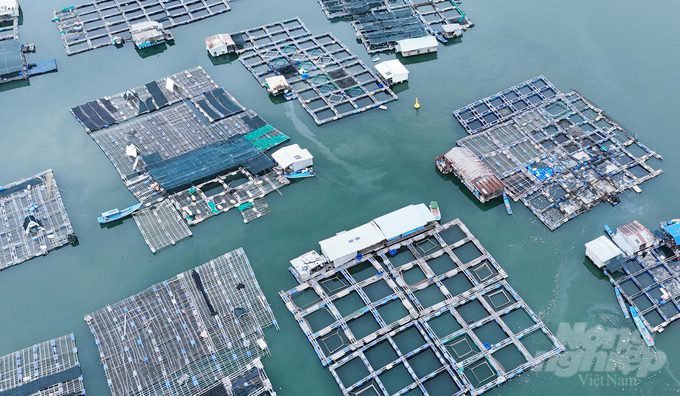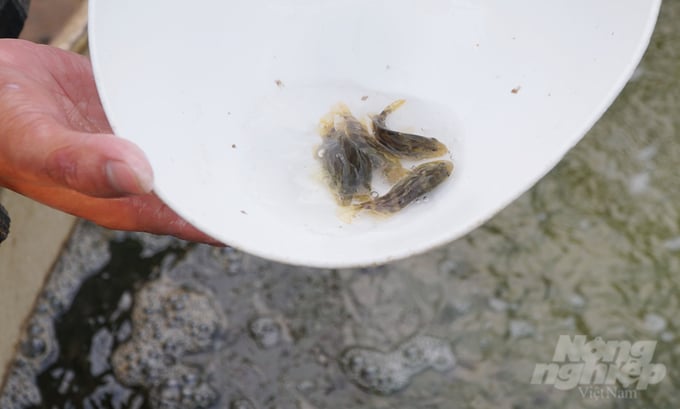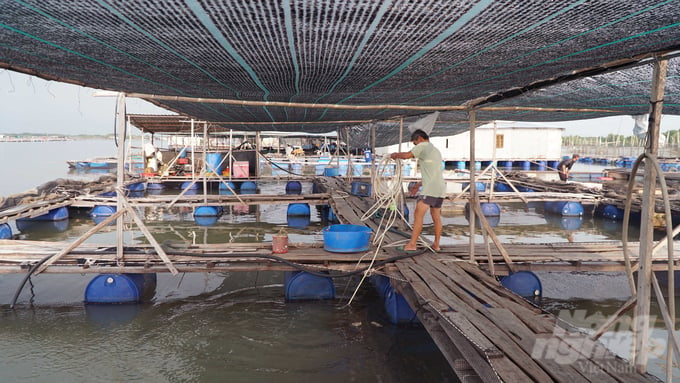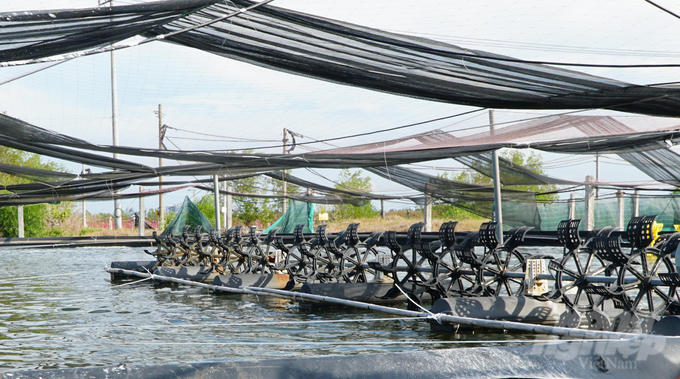November 27, 2025 | 21:48 GMT +7
November 27, 2025 | 21:48 GMT +7
Hotline: 0913.378.918
November 27, 2025 | 21:48 GMT +7
Hotline: 0913.378.918

Open aquaculture, which depends on the natural environment, is always subject to negative impacts from the weather. Photo: Le Binh.
Despite carefully preparing for disease prevention since the beginning of the year, lobster and fish cages of Le Ngoc Nam (village 9, Long Son commune, Vung Tau city) were still affected. The fish loss rate was higher than normal.
“Although the rate of fish getting sick is lower and they don’t stop eating as much as before, overall productivity is not good. Hopefully, when the weather is less rainy and windy, the fish cages will be in better conditions,” Nam said.
Information from Ba Ria - Vung Tau Hydrometeorological Station shows that from August to September every year, the province experiences a lot of rain and is affected by storms and tropical depressions. Rainwater from the shore flows down, causing the salinity of the river water to suddenly decrease, causing shock and making the fish stop eating. There is a possibility that rainwater carries impurities from the shore, causing the water source to lack oxygen locally. This may be the main reason why the fish lose their slime and die quickly.
As of date, the disease situation in aquatic products in the province is not too serious as it only occurs on a small scale. Aquatic products affected by the disease are mostly from open farms which are greatly affected by weather and environmental pollution.

Standard seeds of good quality are also an important factor in limiting diseases in aquaculture. Photo: Le Binh.
According to Huynh Van Them, Deputy Head of Ba Ria - Vung Tau Sub-Department of Livestock Production and Animal Health, since the beginning of 2024, the disease area on commercial shrimp is 4.8 ha, down 71.25% compared to the same period in 2023. Shrimp infected with Acute Hepatopancreatic Necrosis Disease (AHPND) mainly occurred in shrimp farming households in Phuoc Thuan commune, Xuyen Moc district.
“The Sub-Department of Livestock Production and Animal Health has coordinated with the locality to provide chemicals and treat the disease. The aim is to isolate the diseased ponds from surrounding ponds and treat the water environment to kill pathogens before discharging the water outside. The disease situation at affected households has been under control without any sign of widespread,” he said.
During the monitoring process, Ba Ria - Vung Tau did not detect any cases of juvenile fish and caged fish infected with neuronecrosis disease. However, last October, there was an unusual fish death in the area. The Sub-Department has instructed farmers on treatment measures to minimize damage caused by the disease.

Aquaculture farmers install oxygen supplement systems for fish cages during stagnant water days. Photo: Le Binh.
In the Cha Va and Dinh rivers, many households raising fish in rafts regularly clean their cages to provide a well-ventilated environment for the fish. The cage-raising household of Doan Thi Nga is an example. They often use an oxygenation system to 'recharge' the fish. Nga in particular often runs this system from 9pm to 6am, because at this time of the day, the oxygen content in the water is at its lowest, making it easy for the fish to die.
“We were instructed by veterinary officers to perform this technique when the water level is low or still. This method does not cost much while the fish can avoid the risk of lack of oxygen, diseases or unusual deaths,” said Nga.

Applying advanced technologies will help aquatic animals avoid negative impacts of extreme weather. Photo: Le Binh.
Technician Doan Van Nam, Head of the Office of Aquaculture, Ba Ria - Vung Tau Department of Fisheries, recommends farmers use large-sized juveniles that have been raised before being put into commercial farming. It is also considered crucial to thoroughly renovate the pond in order to eliminate pathogens in the pond and manage the pond environment and aquatic health.
“For whiteleg shrimp in particular, individuals and organizations are encouraged to apply effective farming models such as models applying 2-3 stage farming, biotechnology, circulation systems, and fewer water changes. These are models that bring high economic efficiency but low risk of disease,” said Technician Nam.
The agricultural sector of Ba Ria - Vung Tau province also encourages aquaculture farmers to apply high technology or closed models, and proactively adapt to climate change to prevent diseases. Many advanced technologies are also being used by businesses in aquaculture, which include shrimp farming with water circulation systems, farming with a covered tarpaulin system, using biological products to improve water sources, etc.
Translated by Samuel Pham

(VAN) On November 27, in the meeting with Minister Tran Duc Thang, Mayor Yin Yong shared Beijing’s experience to improve environment and air quality.

(VAN) After 30 years, both sides identified strategic areas of cooperation: sustainable production, increasing coffee value and training for farmers.
/2025/11/27/4910-4-164708_294.jpg)
(VAN) On the afternoon of November 27 in Beijing, Minister of Agriculture and Environment Tran Duc Thang held a working session with several major Chinese enterprises operating in the agriculture and environment sector.

(VAN) The Department of Animal Health issued a provisional guideline requesting local authorities to increase surveillance, collect samples for testing, and conduct epidemiological investigations according to the established procedure.

(VAN) The United Nations recommends that Vietnam utilize data and artificial intelligence to enhance early disaster warnings and reduce GDP losses by 3.2% in the context of climate change.

(VAN) On the morning of November 27 in Beijing, Minister Tran Duc Thang and the Deputy Commissioner General of the General Administration of Customs of China signed a protocol on fresh jackfruit exports.

(VAN) As floodwaters recede, a vast network of irrigation works across eastern Gia Lai is emerging in a state of severe disrepair, with extensive damage demanding urgent restoration ahead of the 2025-2026 winter-spring cropping season.